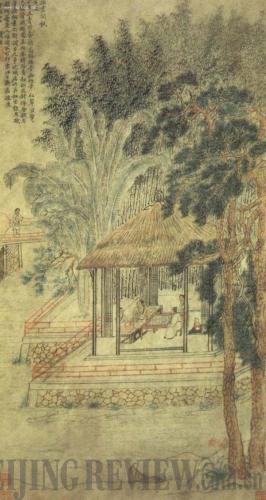|
 |
|
(COURTESY OF DAVID GOSSET) |
The coexistence of a gigantic bureaucratic state with an overall social plasticity and transformation whose scale has no equivalent in world history is a paradox that puzzles China watchers. Why is China so comfortable with change while Western democracies dangerously lack the capacity to question their assumptions and could be, in the long term, threatened by immobility, inertia and complacency?
As China's renaissance is gradually reshaping the 21st century and taking our global system to another level, the understanding of the nation has become a practical necessity. Instead of continuously trying to lecture in a tone of superiority about what it poorly terms an "emerging market," the West would gain much by putting itself more modestly in a mode where it can accept being inspired by a source of civilization whose renewal, far from being a threat, is contributing to the world's equilibrium. As China's intellectuals endeavor to reconnect with the universal message of their tradition, China's humanistic revival is also the promise of a more harmonious global village.
 |
|
CHINA EXPERIENCE: Ming Dynasty painter Qian Gu (1508-78) realizes an exquisite masterpiece when, in a mood of ease and poise, he portrayed A Weiqi Game at the Bamboo Pavilion (COURTESY OF DAVID GOSSET) | By the consideration of Weiqi, one of the most significant symbols of Chinese mental geography, one can develop a better understanding of the dynamics at work in politics, business or even in more trivial social interactions. The Weiqi envelops an aesthetic and an intellectual experience that takes us closer to the Chinese psychology, and gives us insights into Chinese strategic thinking but is also, to a certain extent, a way to approach the fundamental patterns of China's collective success. Beyond their affiliation or their ritualistic rigidity, members of the Communist Party of China or the bureaucrat-mandarin are, above all, individuals whose behaviors are determined by an underlying cognitive culture that can explain what, at first glance, seems to be paradoxical.
Zbigniew Brzezinski, former National Security Advisor to U.S. President Jimmy Carter, wrote in The Grand Chessboard in 1997: "Eurasia is the chessboard on which the struggle for global primacy continues to be played." But is Beijing playing chess? On Eurasia and beyond, Chinese strategists are not engaged in a chess game but are probably designing a series of moves congenial with their own understanding of strategy. While Westerners might navigate a world mapped as a chessboard, the Chinese mind circulates on a weiqi board.
An artistic skill
The literary chronicle by Japanese writer Yasunari Kawabata (1899-1972) of an intense intellectual duel, translated in English as The Master of Go, certainly contributed to the popularity of the game in the West, but weiqi is a product of Chinese civilization and spread over time in the educated circles of Northeast Asia. Kawabata, who viewed his book as one of his favorite creations, knew for China the game of "abundant spiritual powers encompassed the principles of nature and the universe of human life" and that the Chinese had named it "the diversion of the immortals."
In imperial China, weiqi had the status of an art whose practice had educational, moral and intellectual purposes. In a Chinese version of the scholastic quadrivium, the Chinese mandarins had to master four arts, known as "qin, qi, shu, hua." It was expected of the gentlemen to be able to play guqin (qin), a seven-stringed zither, write calligraphy (shu) and demonstrate talent at brush painting (hua). The second artistic skill, qi, refers to weiqi, a strategy game played by two individuals who alternately place black and white stones on the vacant intersections of a grid. The winner is the one who can control, after a series of encirclements, more territory than the opponent. One can translate weiqi as "the board game of encirclement" or "the surrounding game." For centuries, players have been fascinated by the contrast between the extreme simplicity of the rules and the almost infinite combinations allowed by their execution.
Traditionally, the game was conceptualized in relation with a vision of the world. In the first part of the 11th century Classic of Weiqi in 13 Sections, the author uses philosophical notions to introduce the game's material objects: the stones "are divided between black and white, on the yin/yang model... The board is a square and tranquil, the pieces are round and active."
The game, "a small Tao," was so popular that it generated obsessive conduct. An addiction to weiqi was considered by the thinker Mencius (372-289 B.C.) as one of five types of unfilial behavior. Through centuries, the game remained an important element of China's society. Ming Dynasty painter Qian Gu (1508-78) painted a masterpiece A Weiqi Game at the Bamboo Pavilion where breeze, water and young maids revolve around the circulations of black and white stones. One of the famous set of 12 screen paintings from the Emperor Yongzheng period (1678-1735) portrays an elegant and refined lady sitting beside a weiqi board. After being criticized during the "cultural revolution" (1966-76), the game is once again fashionable among China's elite. Master Nie Weiping and disciple Gu Li, among the world's top players, are acclaimed celebrities.
|
